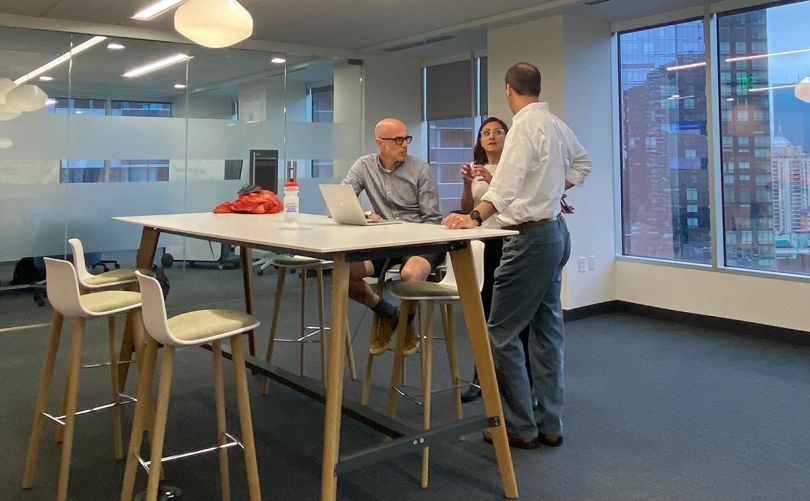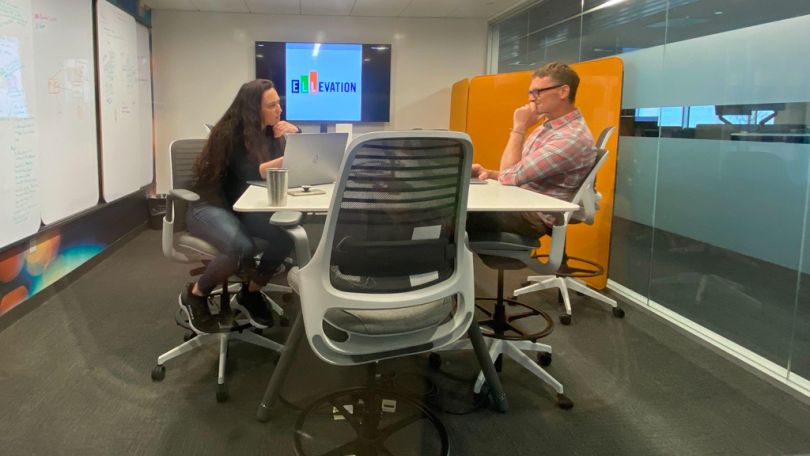Go ahead, pump that fist. You just landed a job interview for what appears to be an exciting engineering opportunity. You’re excited, nervous and flattered as you prepare for the next steps. What do those look like, anyway?
Well, it’s probably a surprise.
That’s unfortunately how many interview processes go. Interviewees are left in the dark when it comes to details like how many interview rounds there will be, who they will speak with, what’s required of them at each stage, and even how to prepare. But why?
Ellevation Education’s engineering team asked the same question. Yet unlike many hiring teams, they agreed that interviews shouldn’t have surprises. That’s why they revamped their interview process and started a new trend.

The three-page PDF is aptly called “The Hitchhiker’s Guide to Ellevation’s Interview Process,” and is emailed to every engineering interviewee. The guide details every step of the process, from the phone screen to the take-home exercise to the “Explain Something You Built” section. And according to the interviewers, it’s working.
“People are much better prepared for the questions we’re about to ask because we give them the questions in advance,” Software Engineer II Tara Yoo said. “And they’re more prepared for the take-home coding tests.”
A more prepared interviewee leads to a better interview, Yoo said, and her team gets a clearer understanding of whether someone is a good fit for the role.
“We’re putting a great foot forward as interviewers, which has translated to getting great candidates who feel like they’ve been respected during the interview process,” Software Engineer II Eva Petzinger said. “It’s the perfect welcome to the collaborative and inclusive culture of our engineering team.”
Built In Boston sat down with three Ellevation Education engineers to learn more about this revamped interview process and the impact it’s made on team culture.
WHAT THEY DO
What was your interview process like at Ellevation?
Yoo: I immediately got the Hitchhiker’s Guide email that laid out each step of the interview process. I loved that. It meant I wouldn’t need to wait around for a week or two, wondering why no one was responding, how I did or what was next. Ellevation was clear and upfront that they would have a debrief right after my interview, and then they’d get back to me within a day or two.
Another unique aspect is that I was able to shape the interview process. I was originally interviewing to be a software engineer I. That would have been a lateral move and a bit of a pay cut for me. So during my interview, I pointed out that based on what I’d already accomplished at my previous company, I should be a software engineer II. Ellevation added an additional round to my interview called “Explain Something You Built,” which is where I got to explain something I had built at my previous job. Through this, I was able to justify being hired as a software engineer II.
That experience also helped Ellevation realize that they should implement the “Explain Something You Built” section for all engineering interviews. I loved how flexible Ellevation was about the interview process, and how we both adapted along the way.
Petzinger: I applied for an implementation manager role (pre-Hitchhiker’s Guide). I was written back quickly to say that that role had been filled, but based on my resume, they wanted me to apply for the data integration specialist role. I interviewed for that role, and I had such positive interactions with the team throughout the interview process. Ultimately, they explained that I didn’t quite have the technical skill set for the role, but they asked me to interview for a product support specialist role. I said, “Sure, why not?” I ended up taking that product support specialist job mainly because I got to know the people on that team throughout that interview.
There’s a lot of flexibility at Ellevation. And if a candidate seems like a good fit for the company, there’s openness to figuring out what role is best for them.
Senior Software Engineer Benjamin Ford: My favorite aspect of the interview process was the take-home coding exercises. I’ve interviewed for positions where it’s an in-person coding exercise, and that just doesn’t jive well with my nerves. I’m more methodical, and like to think through a problem quietly by myself instead of thinking out loud.

What’s a positive change that has come with this revamped interview process?
Petzinger: Dan Milstein, our CTO, stressed the goal of making sure we eliminate as much bias as possible from the interview process. Prior to The Hitchhiker’s Guide, our post-interview debriefs would sometimes include phrases like “I like them.” That’s now a forbidden phrase. Because liking someone is a biased way to evaluate the evidence that showed or didn’t show whether they could do this job.
The Hitchhiker’s Guide is a byproduct of us trying to get intentional about evidence-based interviewing and answering the questions for each facet of the job. Has the person shown evidence that they can do it? Our debriefs now, which happen twice a week, feel very focused. As interviewers, we take copious notes.
Ford: Another change is that we once had a 1-5 scale to rate the interviewee. But now we have a 1-4 scale, because too many people kept doing threes and staying neutral. That’s not helpful for decision-making. This new scale pushes us to dig deeper and be more intentional.
We’ve all had a bad interview before. How has that experience helped you be a better interviewer?
Yoo: I once had an interview where I had a “deer in the headlights” moment when I was asked a question about Recursion and I had no idea how to respond. That’s really impacted how I interview because I’ve had interviewees get stuck during the technical round and have that same uncomfortable moment. People don’t realize that the interviewee wants you to succeed. I’m not trying to stump you. It’s not me versus you. It’s painful when someone gets stuck and embarrassed and doesn’t want to ask for help. I would love it if an interviewee asked for help. It shows a willingness to collaborate, and a willingness to seek and listen to feedback. It’s not a weakness to ask for help. If you do get the job, you’re going to collaborate with me and many other team members.
Ford: It has definitely given me empathy. Years ago when I was interviewing for a job, I flunked the in-person coding test. I thought I knew what to expect for the role. Turns out, I didn’t. There were core concepts that I hadn’t heard of because at the time, I wasn’t well-versed in that role. From that experience, I learned that it’s crucial to make people feel comfortable, even if they’re not a great fit for the role. Who knows, maybe they’d fit somewhere else at the company, or be a good fit down the line. A little empathy goes a long way.
DELL
What is the culture like on the engineering team at Ellevation?
Petzinger: I was worried that we would lose a lot of the cultural aspects that made Ellevation special at the onset of remote work during the pandemic. But because of the strong relationships and fun people we already had, paired with a large remote workforce, we didn’t miss a beat. We’ve tried to keep the Zoom chat alive during company all-hands.
Ford: The company feels very flat. When I first joined, I immediately felt comfortable asking the most senior person in engineering questions. It’s a low-ego environment.
Yoo: Ellevation is open to tough questions. When I interviewed with the CEO Jordan Meranus, he asked me to list all the stuff that concerned me about Ellevation. It’s a private company, so prior to the interview, I wasn’t able to gain much insight into the financials. So I asked Meranus questions about cash flow, profit model, revenue and growth. He was upfront and eager to answer all of my questions. There’s a lot of transparency here.




